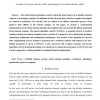543 search results - page 9 / 109 » A Comparative Analysis of Process Maturity Level and Quality |
TEC
2002
14 years 11 months ago
2002
The clonal selection principle is used to explain the basic features of an adaptive immune response to an antigenic stimulus. It establishes the idea that only those cells that rec...
BMCBI
2008
15 years 1 days ago
2008
Background: Growing interest in the application of natural language processing methods to biomedical text has led to an increasing number of corpora and methods targeting protein-...
107
click to vote
ICSE
2011
IEEE-ACM
14 years 3 months ago
2011
IEEE-ACM
In this paper, we examined the impact of project-level configurational choices of globally distributed software teams on project productivity, quality, and profits. Our analysis u...
SEMCO
2009
IEEE
15 years 6 months ago
2009
IEEE
Software development and maintenance are highly distributed processes that involve a multitude of supporting tools and resources. Knowledge relevant to these resources is typicall...
139
click to vote
ECMDAFA
2006
Springer
15 years 3 months ago
2006
Springer
Abstract. Design patterns are templates of general solutions to commonlyoccurring problems in the analysis and design of software systems. In mature development processes, engineer...

